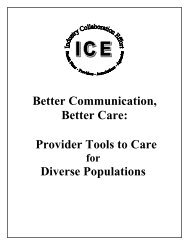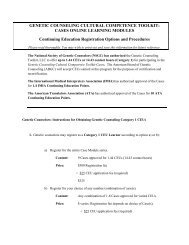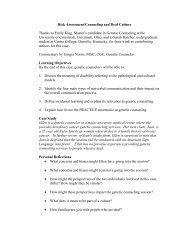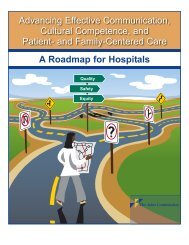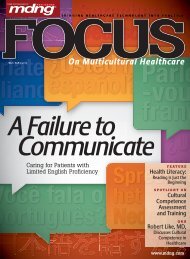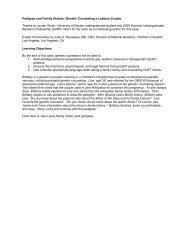making the business case for culturally and linguistically appropriate ...
making the business case for culturally and linguistically appropriate ...
making the business case for culturally and linguistically appropriate ...
You also want an ePaper? Increase the reach of your titles
YUMPU automatically turns print PDFs into web optimized ePapers that Google loves.
lectures, demonstrations, group activities, videos, <strong>and</strong> practice exercises aimed at helpingparticipants become more effective <strong>and</strong> professional when facilitating communicationbetween health care providers <strong>and</strong> LEP patients. One goal of <strong>the</strong> course is to offerparticipants opportunities to practice interpreting skills in a safe <strong>and</strong> supportive environment.This training is not intended to serve as an accreditation or a language enhancement program.The courses are conducted in English with resource materials <strong>and</strong> practice exercises availablein nine languages. The training was pilot tested in 2001 at various levels of health planoperations be<strong>for</strong>e being made available throughout L.A. Care’s contracted provider network.Topics addressed in <strong>the</strong> 40-hour training include:• The Right to an Interpreter in a Health Care Setting• Ethical Principles of Health Care Interpreting (based on <strong>the</strong> Cali<strong>for</strong>nia St<strong>and</strong>ards <strong>for</strong>Health Care Interpreters developed by <strong>the</strong> Cali<strong>for</strong>nia Healthcare InterpretingAssociation [CHIA])• Elements of Message Clarifying• Memory Development• Interpreting Protocols• Sight Translation• Practice Dialogues <strong>and</strong> Basic Medical Terminology in English <strong>and</strong> Languages O<strong>the</strong>rthan English• Culture <strong>and</strong> Its Impact on Communication• Patient Advocacy• Tips <strong>for</strong> Professional DevelopmentBENEFITS/RESULTS. Participants who complete <strong>the</strong> course help raise awarenessthroughout <strong>the</strong> system about <strong>the</strong> importance of providing trained <strong>and</strong> qualified interpreters topatients <strong>and</strong> <strong>the</strong>ir providers, an outcome that gives <strong>the</strong>ir organizations additional protectionfrom liability. The project yielded positive feedback from providers <strong>and</strong> staff who werealready functioning as interpreters. Many were especially appreciative of <strong>the</strong> opportunity tobe <strong>for</strong>mally trained in skills <strong>the</strong>y were already struggling to apply in<strong>for</strong>mally <strong>and</strong> found <strong>the</strong>training to be a <strong>for</strong>um to express concerns about practices <strong>for</strong> which <strong>the</strong>re were often nowritten policies or manuals to guide <strong>the</strong>m. Administrators at one of <strong>the</strong> larger hospitals in <strong>the</strong>county saw <strong>the</strong> program as a way to support larger institutional changes underway in <strong>the</strong>delivery of services, <strong>and</strong> plan—in just one hospital alone—to send 1,000 bilingual employeesthrough <strong>the</strong> training courses.Despite limitations of a brief 40-hour course, many graduates of <strong>the</strong> program find <strong>the</strong>y areable as a result to serve more effectively as interpreters in <strong>the</strong>ir workplaces. They rely less ontelephone interpreters, saving money <strong>and</strong> improving services to patients in areas where <strong>the</strong>ywere previously lacking.Training focuses on improving communication between providers <strong>and</strong> LEP patients. Bettercommunication results in higher quality care, improved patient satisfaction, better patientcompliance, improved health outcomes, <strong>and</strong> increased provider compliance with state <strong>and</strong>federal laws <strong>and</strong> insurance contracts.The project began with a consultant that L.A. Care retained to conduct a series of health careinterpreter trainings <strong>and</strong> to develop materials that <strong>the</strong> health plan could use <strong>for</strong> presentation57



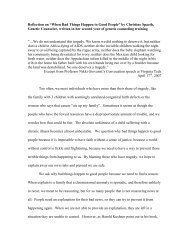
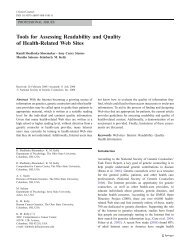

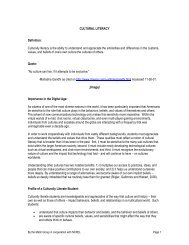
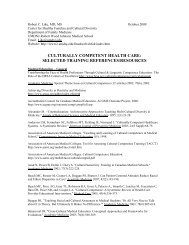

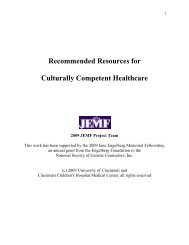
![Breaking Bad News PPT[1] - Genetic Counseling Cultural ...](https://img.yumpu.com/35003134/1/190x146/breaking-bad-news-ppt1-genetic-counseling-cultural-.jpg?quality=85)
